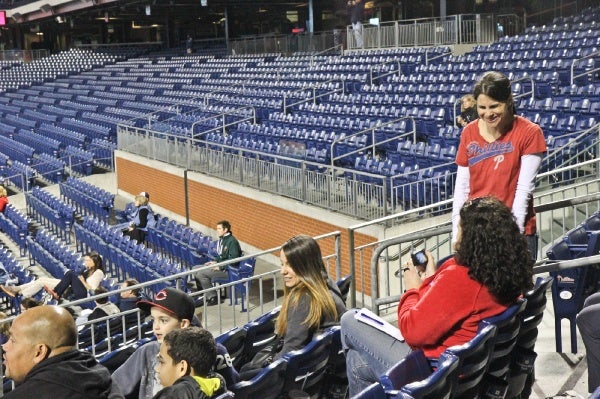Practice run allows families affected by autism to prepare for a Phillies’ game
Baseball is the all-American summer pastime, but for families affected by autism, going to the ballpark can quickly become overwhelming.
A local pediatrician is working to make these families feel welcome and at ease at Phillies games.
Noise, crowds, long lines and bright lights are all part of the baseball experience — but they all spell trouble for those with autism. How can they ease into this challenging environment? With lots of practice.
On a recent week night, when the Phillies were on the road, Sabra Townsend and her teenage son Brandon attended a college game at Citizens Bank Park. Brandon has autism, and like many with this developmental disorder, he is very sensitive to the world around him.
This practice game allowed Brandon to get a feel for how he would do at a Phillies game. Brandon was watching the game, and talking to himself.
“Right now he has a bit of a chatter,” said Townsend. “I know that he is overstimulated, because he is just hyperactive. So it can be a challenge, just trying to have him stay on an even keel.”
It was the first visit to the ballpark for 9-year-old John King who came with his mother, Caroline King.
“Transitioning is a challenge for John, also focusing and attention,” explained King. “In large crowds, he tends to scoot, and it’s difficult to keep up with him, so this is a perfect environment to practice on all these three areas.”
Making the everyday experiences possible
Developmental pediatrician Wendy Ross organized the ballpark dry runs for families.
“For the families that I see in my practice, they really want to go and have everyday experiences with their kids,” she said.
“When they go to bed at night, they worry about how independent their kids are going to be one day when they are not here,” she explained. “So step by step, we just want to bring them out into the world and make them comfortable.”
In addition to working as a pediatrician, Ross runs the nonprofit Autism Inclusion Resources.
Ross says many parents have so much anxiety over how their child will cope in a new setting, they just avoid anything new.
She uses a step-by-step approach that started long before arriving at the park.
“We prepared the families with photographs, with schedules, with special stories that talk about the social situations and what they can expect,” she said.
Those materials are all available on Ross’ website.
Leading up to the practice, Ross also spent 10 nights training Phillies staff and food vendors.
“The trainings were not meant to make autism experts, but to just improve awareness but in a really practical, functional way,” she said.
For example — to spot a kid who is having a meltdown and offer a quieter place to retreat to. Or to be patient when a person does not respond to verbal cues.
Training at ballpark offers insights on autism
Dawn Overwise, who supervises hosts at Phillies games, says she learned a lot during the training.
“Autism doesn’t have one face and one need, and I didn’t know that,” she said. “Every family has different needs when it comes to autism.”
For Ross, easing families into the Phillies experience is just one aspect of a larger vision.
“We’re hoping to work with SEPTA soon, we have already worked with Philadelphia International Airport,” she explained. “We’re hoping to make Philadelphia really one of the most accessible cities in the world, not just for physical disabilities, but for people with social disabilities like autism.”
Townsend and her son Brandon have a more immediate goal in mind — after getting through this ballgame without serious problems — they are ready to return so Brandon can see his first Phillies game.
“We’ll be back on Saturday,” she promised.
WHYY is your source for fact-based, in-depth journalism and information. As a nonprofit organization, we rely on financial support from readers like you. Please give today.







